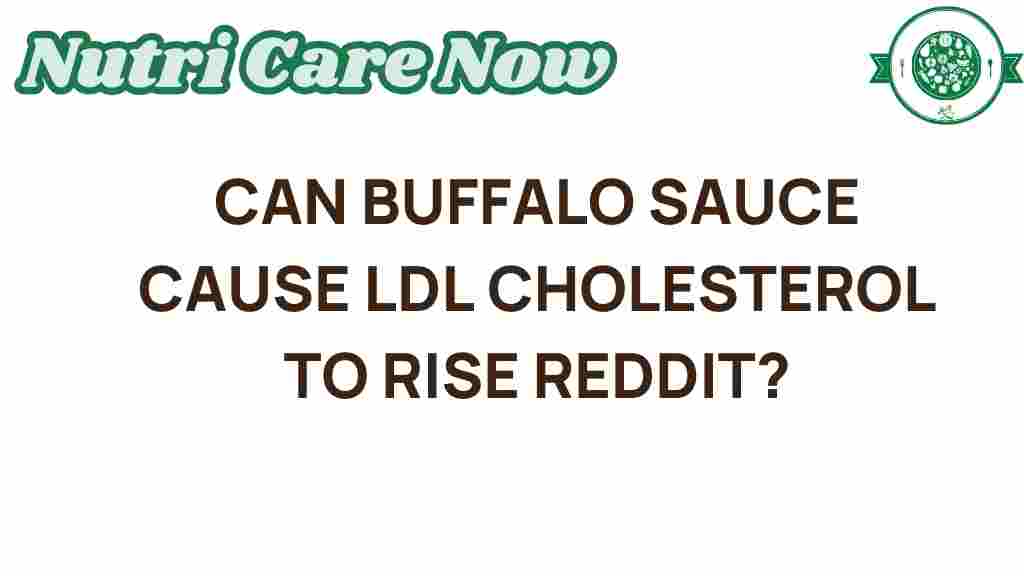Can Buffalo Sauce Really Boost LDL Cholesterol Levels?
Buffalo sauce is a popular condiment known for its spicy kick, often enjoyed with chicken wings, pizza, and various dishes. However, there are ongoing discussions about its impact on health, particularly regarding LDL cholesterol levels. This article aims to explore whether buffalo sauce can indeed influence LDL cholesterol levels and debunk some health myths surrounding this spicy condiment. We will delve into the nutritional facts, health implications, and insights based on various discussions, including those on platforms like Reddit.
Understanding LDL Cholesterol
Before we dive into the effects of buffalo sauce, it’s essential to understand what LDL cholesterol is. LDL stands for low-density lipoprotein, often referred to as “bad” cholesterol. High levels of LDL cholesterol can lead to plaque buildup in the arteries, increasing the risk of heart disease and stroke. Therefore, maintaining healthy LDL cholesterol levels is crucial for overall heart health.
The Nutritional Profile of Buffalo Sauce
Buffalo sauce is typically made from a combination of hot sauce, butter, and other ingredients. Here are some key nutritional facts:
- Calories: A tablespoon of buffalo sauce contains about 25 calories.
- Fat: Approximately 2.5 grams of fat, primarily from butter.
- Sodium: High in sodium, with around 330 mg per tablespoon.
- Vitamins: Contains small amounts of vitamins A and C, depending on the hot sauce used.
While buffalo sauce does contain fat, it’s important to consider the type of fat. The butter in buffalo sauce is a source of saturated fat, which has been linked to increased LDL cholesterol levels. However, moderation is key when incorporating fats into your diet.
The Dietary Impact of Buffalo Sauce on LDL Cholesterol
Now, let’s address the question: can buffalo sauce really boost LDL cholesterol levels? The answer is not straightforward and depends on several factors.
1. Ingredient Quality
The effect of buffalo sauce on your LDL cholesterol largely depends on its ingredients. Homemade buffalo sauce can be made with healthier fats or alternative ingredients that may have a lesser impact on cholesterol levels. For example:
- Using olive oil instead of butter can lower saturated fat content.
- Adding vinegar can enhance flavor without additional calories or fats.
2. Portion Size
Another critical factor is portion size. While a small amount of buffalo sauce is unlikely to have a significant effect on LDL cholesterol, excessive consumption, particularly in conjunction with high-fat foods, can contribute to increased cholesterol levels.
3. Overall Diet
Your overall dietary patterns play a crucial role in determining your cholesterol levels. If buffalo sauce is consumed as part of a balanced diet rich in fruits, vegetables, whole grains, and lean proteins, its impact on LDL cholesterol will be minimal. Conversely, a diet high in saturated fats and trans fats can exacerbate cholesterol issues.
Health Myths Surrounding Buffalo Sauce and Cholesterol
As with many foods, buffalo sauce is often surrounded by health myths. Here are some common misconceptions:
- Myth 1: Buffalo sauce alone will raise your LDL cholesterol.
- Fact: It’s the overall diet and lifestyle that primarily affect cholesterol levels.
- Myth 2: Spicy foods like buffalo sauce always lead to heart problems.
- Fact: Spices can have health benefits, including anti-inflammatory properties.
- Myth 3: All fats are bad for cholesterol.
- Fact: Unsaturated fats can be beneficial for heart health when consumed in moderation.
Insights from Reddit Discussions
Interestingly, discussions on platforms like Reddit often shed light on personal experiences and opinions regarding buffalo sauce and cholesterol. Many users share their experiences with dietary changes and how these have affected their cholesterol levels. Here are some key takeaways:
- Many Reddit users report that they enjoy buffalo sauce in moderation and have not seen a significant impact on their cholesterol.
- Some users advocate for homemade versions to control ingredients and reduce unhealthy fats.
- Others emphasize the importance of a balanced diet rather than singling out one food item when considering heart health.
Step-by-Step: How to Enjoy Buffalo Sauce Healthily
If you’re a fan of buffalo sauce but are concerned about LDL cholesterol, here’s a step-by-step guide to enjoying it healthily:
- Choose Quality Ingredients: Make your buffalo sauce with healthier fats, such as olive or avocado oil.
- Control Portions: Use a measuring spoon to keep your servings in check.
- Pair Wisely: Use buffalo sauce as a flavor enhancer for vegetables or lean meats instead of fried foods.
- Balance Your Plate: Ensure your meals include ample fruits, vegetables, and whole grains for a balanced diet.
- Stay Informed: Keep up with nutrition facts and health advice from reliable sources, such as Healthline.
Troubleshooting Tips for Heart Health
If you’re monitoring your LDL cholesterol levels, consider these troubleshooting tips:
- Regular Check-Ups: Schedule regular blood tests to monitor your cholesterol levels.
- Consult a Nutritionist: A registered dietitian can provide personalized dietary advice.
- Stay Active: Regular exercise can help manage cholesterol levels effectively.
- Limit Other Sources of Saturated Fat: Pay attention to your overall fat intake from dairy, red meats, and processed foods.
Conclusion
In conclusion, buffalo sauce does not inherently boost LDL cholesterol levels, but its impact depends on the ingredients used, portion sizes, and your overall dietary habits. By being mindful of these factors and debunking common health myths, you can enjoy buffalo sauce as part of a balanced diet. Engaging in discussions on platforms like Reddit can also provide valuable insights and tips from other health-conscious individuals.
Always remember that moderation is key, and maintaining a well-rounded diet is essential for heart health. If you have specific concerns about your cholesterol levels, consulting a healthcare professional is advisable.
For more information on heart health and dietary tips, check out this resource.
This article is in the category Health and created by NutriCareNow Team
